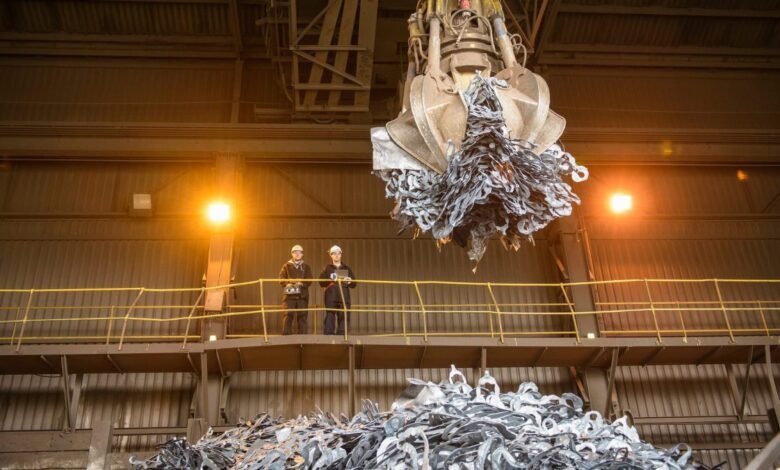Sortera Turns Scrap Aluminum Into Cash

▼ Summary
– Aluminum is infinitely recyclable and cheaper to recycle than producing new aluminum, yet only about one-third of aluminum in the U.S. gets recycled due to sorting challenges.
– Sortera has developed an AI system that sorts aluminum grades with over 95% accuracy using lasers, X-ray fluorescence, and high-speed cameras to classify and separate chips in milliseconds.
– The system’s speed and accuracy allow for profitable sorting without melting the aluminum first, which is crucial because unsorted alloys are worth far less and can’t meet customer specifications.
– Sortera has become cash flow positive and is expanding with a second plant after raising $45 million in funding, processing millions of pounds of aluminum monthly from sources like shredded automobiles.
– The sorted aluminum is primarily used by automotive manufacturers to reduce vehicle weight and improve fuel efficiency, and Sortera aims to eventually process all U.S. aluminum profitably while exploring other metals.
Recycling aluminum offers a powerful environmental and economic advantage, given its ability to be reused repeatedly with far less energy than producing new metal. Despite this, the United States recycles only about one-third of its aluminum, largely because sorting mixed scrap by alloy type has remained a persistent obstacle. Sortera, a technology-driven recycling company, believes it has solved this problem with a proprietary system capable of identifying and separating aluminum grades with more than 95% accuracy.
The company’s method relies on an artificial intelligence model that analyzes data from lasers, X-ray fluorescence, and high-speed cameras. Each piece of scrap, roughly the size of a large potato chip, must be classified in a fraction of a second. According to CEO Michael Siemer, “Ten milliseconds is a long time.” Once the vision system determines the alloy, precisely aimed air nozzles divert the chip into the appropriate bin.
This speed and precision are critical. Conventional recycling operations typically melt aluminum before determining its alloy composition. When different alloys are mixed together, the resulting material loses significant value because manufacturers cannot rely on its mechanical properties. “People have been wanting to go after this unsorted aluminum, and nobody’s been able to unlock it,” Siemer notes.
Sortera’s sorting accuracy has not only addressed a major industry bottleneck but also enabled the company to achieve profitability. Siemer explains that margins improve dramatically as accuracy increases: “The margin is exponential above 90%. Ninety-two percent gets you a nice little margin, 95% gets you a big margin, and 98% is a really big margin.”
Thanks to these efficiencies, Sortera has been cash flow positive since August, operating from a single facility in Indiana. To support expansion, the company recently secured $20 million in equity and $25 million in debt. The funding round was led by VXI Capital and accounts advised by T. Rowe Price, with participation from Overlay Capital and Yamaha Motor Ventures. Trinity Capital is also providing equipment financing.
A second plant is now under construction near Nashville and is expected to begin operations in April or May. Siemer describes it as a replica of the Indiana facility, which runs continuously, processing millions of pounds of aluminum each month.
Much of the scrap processed by Sortera originates from shredded automobiles. When vehicles are shredded, different aluminum alloys fracture in unique ways, creating visual signatures that the AI system learns to recognize. “The chemical differences manifest themselves in the shredding,” Siemer says. Distinctive tears and folds offer clues, allowing the system to identify a specific grade, such as 356 aluminum, within milliseconds.
Looking ahead, a significant portion of Sortera’s sorted aluminum is likely to return to automotive supply chains. Car manufacturers are increasingly turning to aluminum to reduce vehicle weight and boost fuel efficiency. “Every auto OEM on the planet has been to Indiana at least twice,” Siemer remarks.
Although the company is exploring ways to sort other metals like copper and titanium, its immediate focus remains on aluminum. Siemer envisions a future where all aluminum produced annually in the U.S., approximately 18 billion tons, could be sorted and sold profitably. “Every piece of that, every pound would be sold at a profit in the U.S.,” he states.
(Source: TechCrunch)